Matt Seigel
Training a Tokenizer for Free with Private Federated Learning
Mar 15, 2022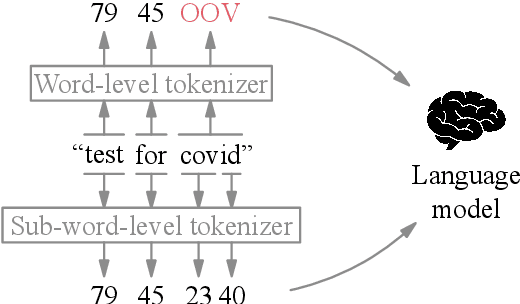
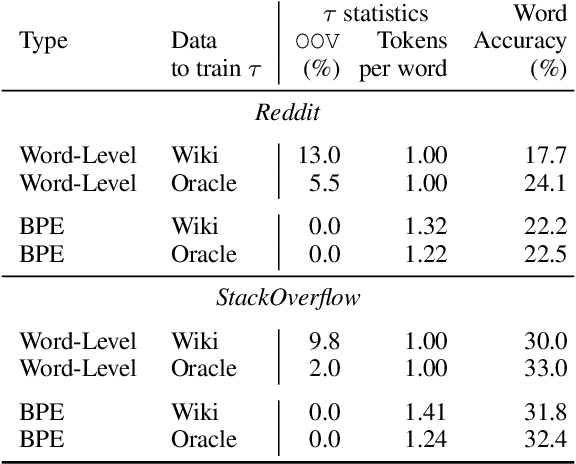

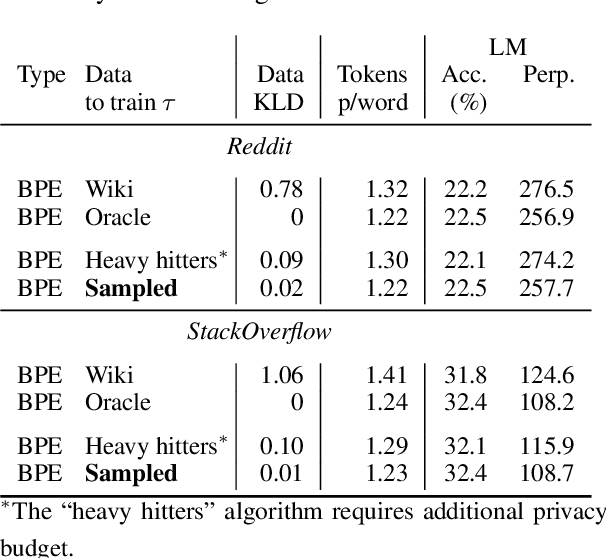
Abstract:Federated learning with differential privacy, i.e. private federated learning (PFL), makes it possible to train models on private data distributed across users' devices without harming privacy. PFL is efficient for models, such as neural networks, that have a fixed number of parameters, and thus a fixed-dimensional gradient vector. Such models include neural-net language models, but not tokenizers, the topic of this work. Training a tokenizer requires frequencies of words from an unlimited vocabulary, and existing methods for finding an unlimited vocabulary need a separate privacy budget. A workaround is to train the tokenizer on publicly available data. However, in this paper we first show that a tokenizer trained on mismatched data results in worse model performance compared to a privacy-violating "oracle" tokenizer that accesses user data, with perplexity increasing by 20%. We also show that sub-word tokenizers are better suited to the federated context than word-level ones, since they can encode new words, though with more tokens per word. Second, we propose a novel method to obtain a tokenizer without using any additional privacy budget. During private federated learning of the language model, we sample from the model, train a new tokenizer on the sampled sequences, and update the model embeddings. We then continue private federated learning, and obtain performance within 1% of the "oracle" tokenizer. Since this process trains the tokenizer only indirectly on private data, we can use the "postprocessing guarantee" of differential privacy and thus use no additional privacy budget.
Enforcing fairness in private federated learning via the modified method of differential multipliers
Sep 17, 2021

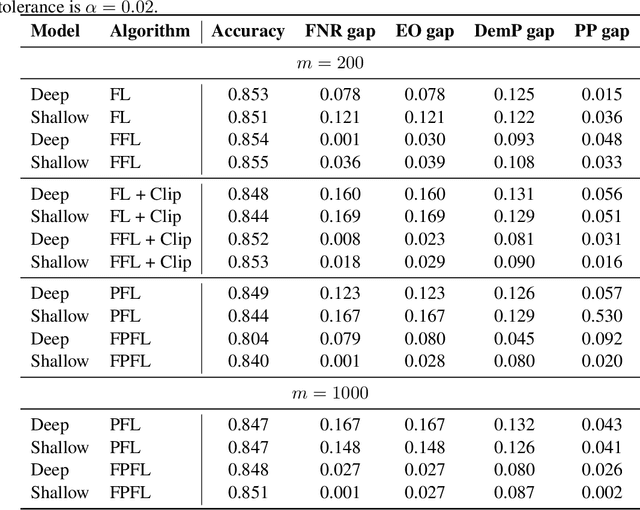
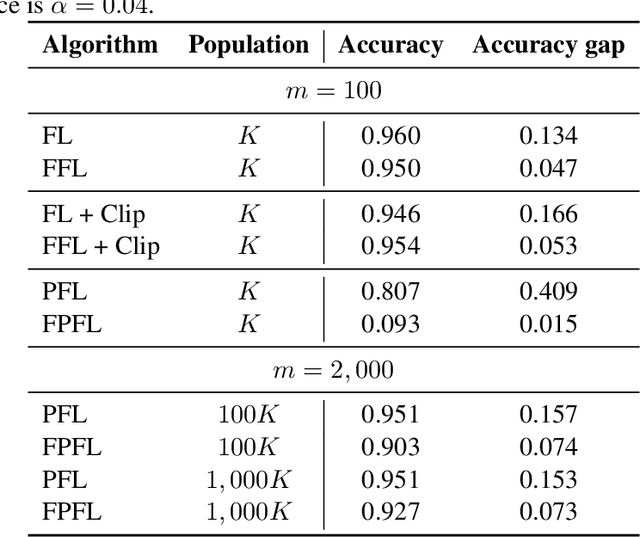
Abstract:Federated learning with differential privacy, or private federated learning, provides a strategy to train machine learning models while respecting users' privacy. However, differential privacy can disproportionately degrade the performance of the models on under-represented groups, as these parts of the distribution are difficult to learn in the presence of noise. Existing approaches for enforcing fairness in machine learning models have considered the centralized setting, in which the algorithm has access to the users' data. This paper introduces an algorithm to enforce group fairness in private federated learning, where users' data does not leave their devices. First, the paper extends the modified method of differential multipliers to empirical risk minimization with fairness constraints, thus providing an algorithm to enforce fairness in the central setting. Then, this algorithm is extended to the private federated learning setting. The proposed algorithm, FPFL, is tested on a federated version of the Adult dataset and an "unfair" version of the FEMNIST dataset. The experiments on these datasets show how private federated learning accentuates unfairness in the trained models, and how FPFL is able to mitigate such unfairness.
Federated Evaluation and Tuning for On-Device Personalization: System Design & Applications
Feb 16, 2021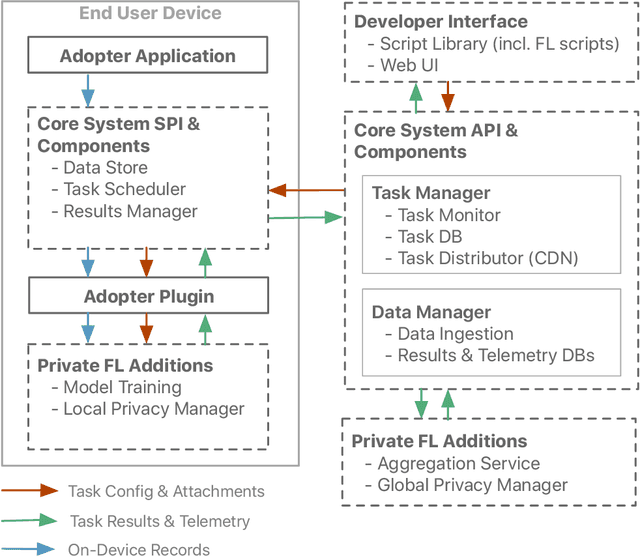
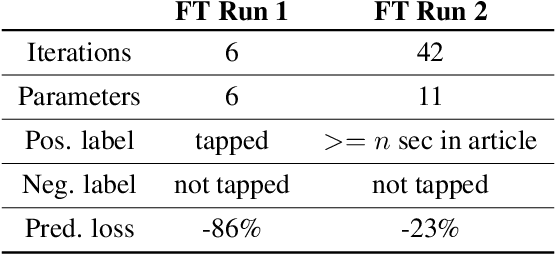
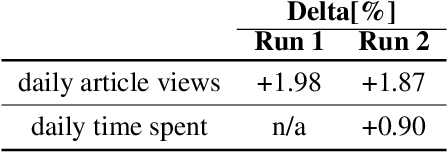
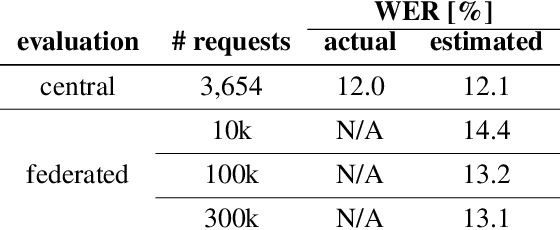
Abstract:We describe the design of our federated task processing system. Originally, the system was created to support two specific federated tasks: evaluation and tuning of on-device ML systems, primarily for the purpose of personalizing these systems. In recent years, support for an additional federated task has been added: federated learning (FL) of deep neural networks. To our knowledge, only one other system has been described in literature that supports FL at scale. We include comparisons to that system to help discuss design decisions and attached trade-offs. Finally, we describe two specific large scale personalization use cases in detail to showcase the applicability of federated tuning to on-device personalization and to highlight application specific solutions.
Improving on-device speaker verification using federated learning with privacy
Aug 06, 2020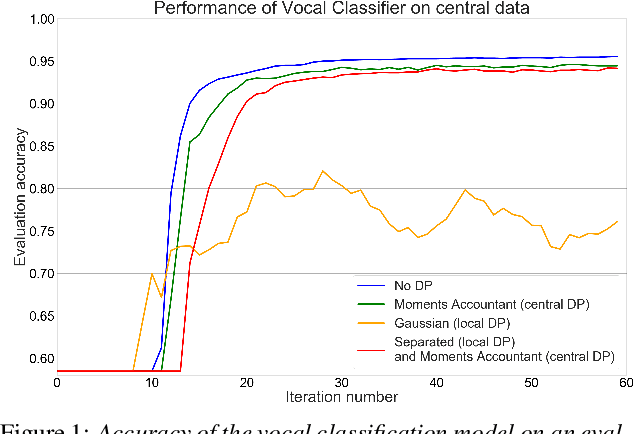

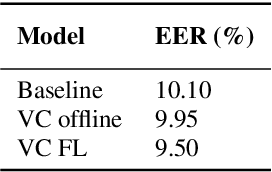
Abstract:Information on speaker characteristics can be useful as side information in improving speaker recognition accuracy. However, such information is often private. This paper investigates how privacy-preserving learning can improve a speaker verification system, by enabling the use of privacy-sensitive speaker data to train an auxiliary classification model that predicts vocal characteristics of speakers. In particular, this paper explores the utility achieved by approaches which combine different federated learning and differential privacy mechanisms. These approaches make it possible to train a central model while protecting user privacy, with users' data remaining on their devices. Furthermore, they make learning on a large population of speakers possible, ensuring good coverage of speaker characteristics when training a model. The auxiliary model described here uses features extracted from phrases which trigger a speaker verification system. From these features, the model predicts speaker characteristic labels considered useful as side information. The knowledge of the auxiliary model is distilled into a speaker verification system using multi-task learning, with the side information labels predicted by this auxiliary model being the additional task. This approach results in a 6% relative improvement in equal error rate over a baseline system.
 Add to Chrome
Add to Chrome Add to Firefox
Add to Firefox Add to Edge
Add to Edge